Excuses are ingrained in us from childhood. We create reasons that stop us from taking action. By not taking action, we never move forward from our current situation. The excuse we are talking about today is the 'what if' excuse or 'just in case' excuse. These excuses stop us in our tracks when decluttering. They limit our ability to see solutions and actions that will simplify our lives. Today, I will share solutions to stop the 'what if' excuses in their tracks and open you up to new possibilities.
Jump to:
- Key Takeaways
- Why Do We Say 'What If' When Decluttering? The Psychology Behind the Excuse
- Questions to Ask Yourself about your stuff
- A Personal Story - The Cable Drawer Confession
- The Real Cost of Keeping 'Just in Case' Items
- How to combat what-ifs and just-in-case excuses
- Frequently Asked Questions About Decluttering 'What If' Excuses
Key Takeaways
- Excuses like 'what if' and 'just in case' obstruct decluttering and clarity, making it hard to let go of items.
- Understanding psychological patterns, such as loss aversion and the endowment effect, helps explain why we hold on to things unnecessarily.
- To combat these excuses, adopt strategies like the 'Just in Case' Box Method and reframe your thoughts about letting go.
- Recognizing the costs of keeping clutter-mental, emotional, and physical-can motivate action toward a clutter-free life.
- Taking consistent small actions and having accountability can help you overcome 'what if excuses, decluttering, and simplify your space.
Why Do We Say 'What If' When Decluttering? The Psychology Behind the Excuse
Before we dive into solutions, it helps to understand why our brains get stuck on 'what if' in the first place. Knowing the reason behind the behavior makes it much easier to push past it. Here are four psychological patterns that keep us holding onto things we no longer need.
Loss Aversion: Why Losing Feels Worse Than Gaining
Psychologists have found that losing something feels about twice as painful as the pleasure we get from gaining something of equal value. This is called loss aversion, and it helps explain why we struggle to let go of our stuff. When you hold that old blender (affiliate) in your hands and think, 'What if I need this someday?' your brain is reacting to the potential loss of the item, not the reality of whether you actually use it. The fear of losing it feels bigger than the benefit of the clear counter space you'd gain.
Here's what I want you to remember: the discomfort of letting go is temporary. The relief of a clutter-free space lasts much longer.
The Scarcity Mindset: Holding On 'Just in Case'
Many of us grew up in households where we were taught not to waste anything. Maybe your parents saved aluminum foil, rubber bands (affiliate), or plastic bags because 'you never know when you'll need them.' That mindset is passed down and can quietly influence how we make decisions about our own belongings decades later.
This is called a scarcity mindset. It's the belief that resources are limited and that you may not be able to replace something if you let it go. When you keep 15 old phone chargers in a drawer because 'what if one of the new ones breaks,' that's the scarcity mindset at work.
The truth is, we live in a world where most everyday items are readily available and often affordable to replace. Shifting from a scarcity mindset to an abundance mindset-believing you can get what you need when you need it-can be incredibly freeing when you're trying to declutter.
Visit my post, "Self Improvement Project for the Best You," for a challenge.
The Sunk Cost Fallacy: 'But I Paid Good Money for That'
Have you ever kept something simply because you spent a lot of money on it, even though you haven't used it in years? That's the sunk cost fallacy. We convince ourselves that keeping the item somehow protects the investment we made, but the reality is that the money is already gone, whether we keep the item or not.
That expensive bread maker collecting dust in the back of your pantry (affiliate)? Keeping it doesn't get your money back. But letting it go does get your space back. And if someone else can actually use it, that's a win for everyone.
The Endowment Effect: Overvaluing What We Own
Here's a fascinating one. Research shows that we tend to place a higher value on things simply because they belong to us. If you own a coffee mug, you'd likely want more money to sell it than you'd be willing to pay to buy the exact same mug from someone else. This is called the endowment effect.
When it comes to decluttering, the endowment effect makes us believe our belongings are worth more-emotionally and financially-than they really are.
Recognizing this bias can help you make more honest decisions about what truly deserves space in your home.
Questions to Ask Yourself about your stuff
Both are likely to cause clutter in our home. Looking around your home, how many things are piling up that resulted from these words? Some questions you may ask yourself that would result in an abrupt stop in decluttering are:
- What if my kids want it?
- What if my next child needs it?
- What if my grandchildren wish to have it?
- And what if I want to take up that hobby again?
- What if I give it to someone who doesn't appreciate it?
- And what if I donate it, and it goes to someone who sells it?
- What if I need the extra cables for the cable apocalypse?
- I will need this old calendar 'just in case' I have to reference it in the future.
I bet you can think of more excuses.
If you can relate to any or all of these excuses, you are not alone. Here is my story (affiliate).
A Personal Story - The Cable Drawer Confession
I've fallen into the 'what if' trap myself. Years ago, I had a home office drawer dedicated to cables, chargers, and cords. USB cables, phone chargers for phones I no longer owned, and adapters for devices I couldn't even identify anymore. I would go to this drawer and store these items whenever I got new devices.
Every time I opened that drawer to find the one cable I needed, I'd spend five minutes untangling a mess of wires intertwined together, and I had no reasoning behind the mess.
My excuse was 'What if I need one of these cables in the future.' Sound familiar?
One weekend, I decided to go through these cables and test them out. Testing the plugs, asking my husband if I needed them. I came to a realization.
My gain from this experience:
It turns out I only needed to keep about three or four of them, and the drawer was easily emptied and used to store other things like sticky notes (affiliate) (my other collection).
That drawer now holds items I actually use. And every time I open it, I find everything neat and accessible, and I feel a little wave of relief rather than frustration.
That's the power of letting go of 'what if excuses.'
The Real Cost of Keeping 'Just in Case' Items
When we say 'just in case,' we think we're protecting ourselves from a future inconvenience. But we rarely stop to think about the very real cost of keeping all those 'just in case' items right now. Let me break it down for you.
The Mental Cost
Every item in your home takes up a tiny bit of mental energy. You may not realize it, but your brain is constantly processing your surroundings. When you walk past a cluttered closet, a stuffed junk drawer, or boxes (affiliate) stacked in the corner, your brain registers all of it-even if you're not consciously thinking about it. Research has shown that visual clutter competes for your attention and reduces your ability to focus. That mental load adds up over time and can leave you feeling overwhelmed, stressed, and even exhausted in your own home.
Want some quotes (affiliate) to motivate you? Check out my post: Simplify Life Quotes to Motivate You to Declutter
The Physical Space Cost
Those 'just in case' items are taking up prime real estate in your home. The extra cables stuffed in a kitchen drawer (affiliate) could be space for utensils (affiliate) you actually use. The boxes (affiliate) of old magazines in the guest room closet could be used to store seasonal decorations.
When 'just in case' items fill your cabinets, closets, and shelves (affiliate), the things you use every day have nowhere to go-and that's when countertops and floors start becoming storage areas.
The Time Cost
Think about how much time you spend working around clutter. You clean around it, organize it, move it from one spot to another, and search through it to find what you actually need.
Every minute you spend managing items you don't use is a minute you're not spending on something that matters to you. Over weeks, months, and years, that time adds up significantly.
The Emotional Cost
Clutter can also affect how you feel about your home. Instead of walking into a room and feeling calm and relaxed, you feel overwhelmed or frustrated. You might even avoid certain areas of your house because the clutter stresses you out. That's a high price to pay for items you're keeping 'just in case.'
The next time you find yourself saying 'what if I need this someday,' ask yourself: what is it costing me to keep it right now?
How to combat what-ifs and just-in-case excuses
Are you ready to eliminate these 'what if's and 'just in case' excuses? Read on to make a difference in your home and life.
Determine what you can control in your life.
The first step in combating these excuses is to determine what things in your home you can control. We can only control how we feel, how we react, what we focus on for certain items, and our attitude about them.
Instead of looking at the things you can't control and getting frustrated, decide on what items you can control and make a decision on. Write a list of things you can control in your life and home, and read it continuously until it becomes memorized.
Then, when you want to declutter, recall the list of items that you can handle right away. This will help you declutter only the things in your realm of responsibility.
We are responsible for what we collect in our lives.
Another thing we need to remember is that we are responsible for the clutter in our lives; instead of ignoring it, we must focus on it and decide what to do about it.
We make the future the way we want it.
If someone else is bringing things into the home, sit them down and discuss openly and honestly how you feel about it. Start with "I feel .... when you bring in something new." Make it about how you think, not blaming them for their actions.
Own up to the fear of the unknown.
We all tend to fear the unknown. 'What if I need this item in the future?' is just one of them. The fear will always be there. So, ask yourself, what if I need this item in the future? You may have to rebuy it.
Instead of buying it at full price, you could buy it secondhand or borrow it from someone. That isn't too bad.
Recognize Aspirational Clutter
One of the sneakiest forms of 'what if' clutter is aspirational clutter. These are the items you keep for a future version of yourself that may never actually arrive.
You know what I'm talking about. You bought the sewing machine five years ago because you were going to start making your own curtains. The stack of cookbooks for elaborate French recipes you've never attempted. The exercise equipment has become an expensive clothing rack. The jeans from ten years ago that you're saving for when you lose those last 15 pounds.
Aspirational clutter is tricky because it's tied to our hopes and dreams, and nobody wants to feel like they're giving up on themselves. But here's what I've learned after more than 20 years of helping people organize their homes: keeping items for a version of yourself that doesn't exist yet isn't motivating. It's actually weighing you down. Every time you see that unused sewing machine, you feel a twinge of guilt, not inspiration.
Ask yourself honestly: Am I keeping this for who I am today, or for a fantasy version of myself? If the answer is the fantasy version, it's time to let it go and make room for the life you're actually living right now. If that future version of you does show up someday, you can always get the supplies then.
Take action even if they are small.
When we look at items and don't make a decision, the "what if I need them" question comes up and stops us from taking action.
Making it a point to decide where the items will go right now will suppress the urge to say, 'But what if I need it later? Remember to take a step forward, no matter how small, to move toward a simpler life.
Small benchmarks help us be more confident to make the next benchmark, and so on.
Have an accountable person.
Having someone who will stop you from saying 'what if' or 'just in case' when you declutter will save you time and frustration. Your process will continue because they will keep you on the task and prevent you from falling into the 'what if I need this...' excuse.
Pick someone who is honest with you. And, help you see what is really going on. Check out my Virtual Organizing Consultations to support you through your decluttering journey.
Try this 'Just in Case' Box Method
If you're really struggling with letting go of items because of 'what if' thinking, here is a fun method that takes the pressure off making a final decision right away. It is called the 'Just in Case' Box Method.'
Here's how it works:
- Get a cardboard box (affiliate) and label (affiliate) it 'Just in Case' with today's date.
- As you declutter, place any items that make you say 'but what if I need this?' into the box.
- Once the box is full, seal it with tape. Do not peek inside.
- Store it somewhere out of sight-your garage (affiliate), a closet, your basement.
- Set a reminder on your phone for 3 months, 6 months, or 1 year from now.
- When the reminder goes off, donate the entire box without opening it.
Here's what happens most often: you won't remember what's in the box. You wouldn't have missed any of it. And you'll realize that your 'what if' fears never actually came true.
This method works because it gives your brain a safety net. You're not making a permanent decision in the moment. You're giving yourself permission to test what life is like without those items. Pick the length that you feel most comfortable with; any length will do, depending on how strong your just in case excuse is to you.
Take a look at Downsizing: How to Start the Process post to jump-start your journey to simplify your life.
Remember that we are not perfect.
We make mistakes, and yes, if we get rid of something useful in the next 5, 10, or 15 years, we need to own up to it and say, "At the time of my decluttering, I didn't need this item. And that is OK." We are not perfect people. If you need something you got rid of years ago, those items will likely be outdated. Plus, someone else was most likely enjoying it at the time. So, was it a bad thing?
Decide what the outcome will be if you give it away, and ask these questions.
When we assume that all the what-ifs are super important, it stops us from making any decisions on letting go of things. So, to combat the 'what-if' excuse, we need to assess the likelihood that the unknown will occur.
To determine the possibility, ask yourself these questions:
Determine how likely this what-if situation will occur.
If I get rid of these ....., what impact would it have on my future life? Pick a number from 100% (it will definitely happen) to 0% (it will likely not happen).
For example, if I give away these extra cables, it is probably 10% likely that I will need them in the next year or five years.
Reflect on how often you use the item now to determine how much you will use it in the future.
Decide how you will feel if you have to find the item later.
Now decide what will happen if your 'what if' comes true. Going back to my example above, will it be challenging to find cables in the next year or five years if I need cables? How stressed would I feel if I had to replace the item in the next year or five years?
Stop using the word 'But.'
We tend to make excuses for decluttering an area or thing in our home. Something like, "I would love to get rid of this, but...." Sound familiar? Change your sentence by removing the word 'But.' By changing how you state your wish, you will shift your mindset and open yourself to letting go of the item.
Visit 43 Positive Mantra Sayings to Keep You on the Decluttering Path for lots of sayings to keep you moving forward in your journey to a lighter life.
Touch Each Item Once & Make a Decision.
Another way to combat these excuses is to take the time to touch every item in your home and make a decision, which may seem too detailed. But when you do it, it will empower you to make a decision. Not all the items in your home will require much thought. You may need a second or two.
Place a trash bag and a recycling bin (affiliate) near you during your decluttering session, and put them in the right spot afterward. Right then and there, don't stop; place the item down and get it to its home. For example, if the item belongs in the kitchen, place it there immediately. No stopping to judge yourself; take the emotions out of it.
Some questions to ask yourself as you pick up each item.
- Does this item need to stay?
- Will someone else get more value from this item?
- Where would I look for this item if I kept it? <<This will help you find a home for this item.
- Would it occur to me where I placed this item if I needed it again?
- Is there a way to get this information or item for free or low cost if I need it again?
Excuses are giving you a sign.
Lastly, after you recognize your 'what if' or 'just in case' excuses, it will signal that you have an underlying problem with this object or decluttering task. Examine the concern (excuse) more deeply to discover why it bothers you. The more time you spend determining your reasons, the more you will learn about yourself and what stops you from decluttering.
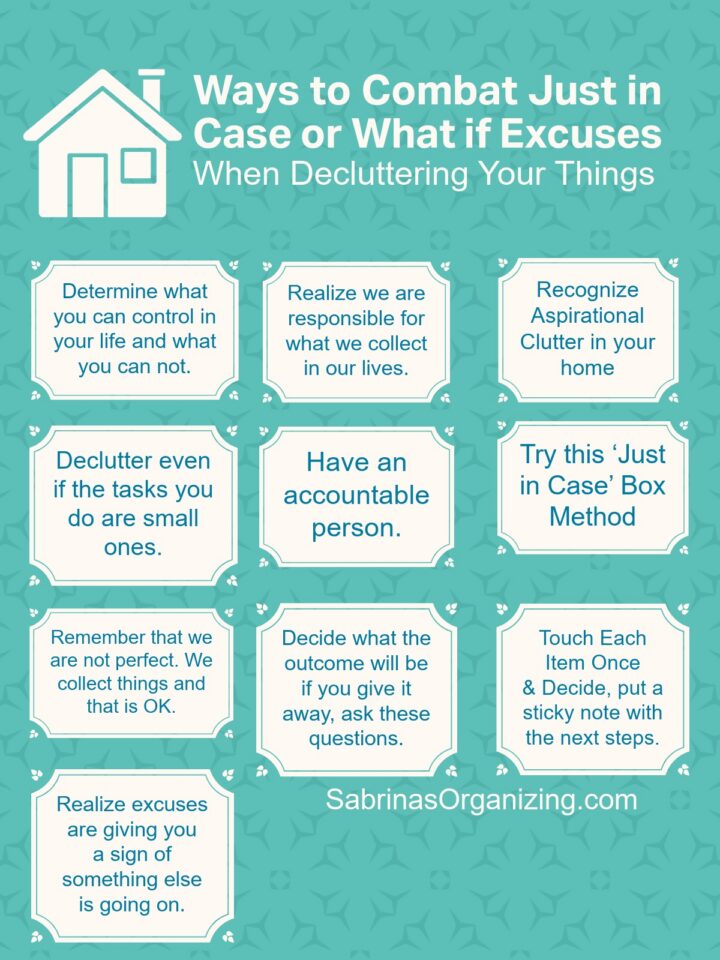
Below are some frequently asked questions to help you!
Frequently Asked Questions About Decluttering 'What If' Excuses
Start by recognizing the 'what if' thought as a signal, not a stop sign. When that thought pops up, pause and ask yourself: When was the last time I actually used this item? If the answer is more than a year, the likelihood that you'll need it is very low. You can also try the 'Just in Case' Box Method described above to give yourself a safety net while you build confidence in letting go.
Absolutely. Guilt is one of the most common emotions people experience when decluttering, especially with gifts, inherited items, or expensive items.
Remember that the guilt you feel is about the story attached to the item, not the item itself. You can honor a memory or a relationship without keeping every physical object connected to it.
Consider taking a photo of sentimental items before donating them so you can keep the memory without the clutter.
This is the big fear, isn't it? Here's the reality: most people who declutter report that they rarely, if ever, regret letting something go. Studies and professional organizers consistently find that people overestimate how much they'll miss an item. And in the rare case that you do need something you decluttered, most everyday items can be borrowed, bought secondhand, or replaced affordably.
The peace and freedom you gain from a clutter-free home far outweigh the small chance of needing to retrieve a single item again.
This is a challenge many families face. Start with your own belongings first-lead by example. When your family sees the positive changes in your spaces, they may become more open to the idea.
For shared spaces, have an open and honest conversation about how the clutter affects everyone. Use 'I feel' statements rather than blame, such as 'I feel overwhelmed when the closet is overflowing' instead of 'You keep too much stuff.'
For children, involve them in age-appropriate decluttering decisions and frame it as making room for the things they love most. Check out my Ways to teach your child to purge their things post for more questions.
Get more information about Questions To Ask Yourself to Stop Worrying about Decluttering when decluttering with family.
The 'ifs and buts' rule is a simple guideline that professional organizers use: if you find yourself making conditional statements about an item-like 'I'd keep this sweater if it were a different color' or 'I like this but it doesn't fit'-that's your signal to let it go.
When you need to add conditions or exceptions to justify keeping something, it usually means the item isn't truly serving you. Keep the items you don't need to make excuses for.
A common guideline is the one-year rule: if you haven't used an item in the past 12 months, it's a strong candidate for decluttering.
Of course, there are exceptions for seasonal items, emergency supplies, and important documents.
But for everyday household items, clothes, kitchen gadgets, and hobby supplies, one year is a fair benchmark. If you want a gentler approach, try the 'Just in Case' Box Method.
Yes. Research has shown that people who describe their homes as cluttered or full of unfinished projects tend to report higher levels of stress and fatigue.
On the other hand, people who describe their homes as restful and organized tend to feel less stressed and more focused.
Decluttering reduces the number of visual distractions your brain has to process, which can help you feel calmer, sleep better, and be more productive in your daily life.
After incorporating these solutions into your life, your what-if excuses will start to fade, and in their place, you will become a successful person with possibilities for everything. I hope this post motivates you to change your mindset and find new ways to combat what-if (just-in-case) excuses.
Please note that these are affiliate links through Amazon (affiliate), and at no additional cost to you, I will earn an affiliate commission if you click through and make a purchase.
Visit our other decluttering posts to help you get rid of stuff.
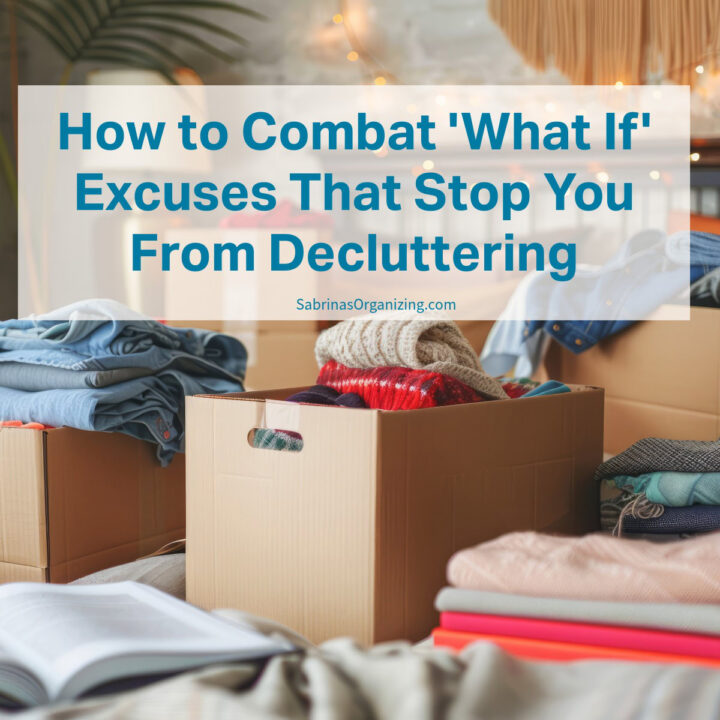
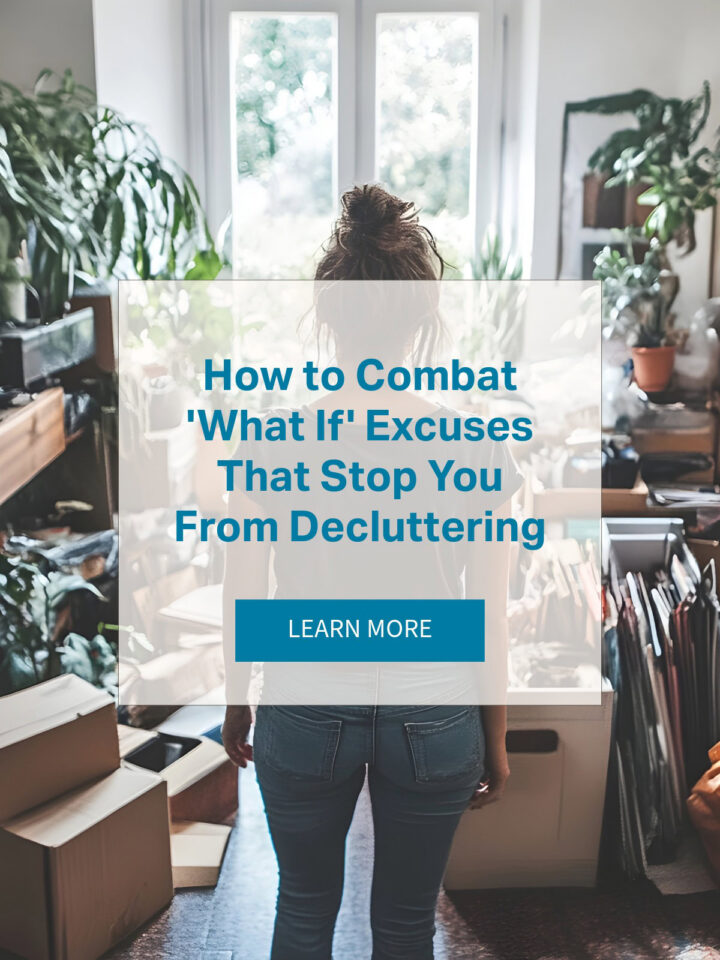


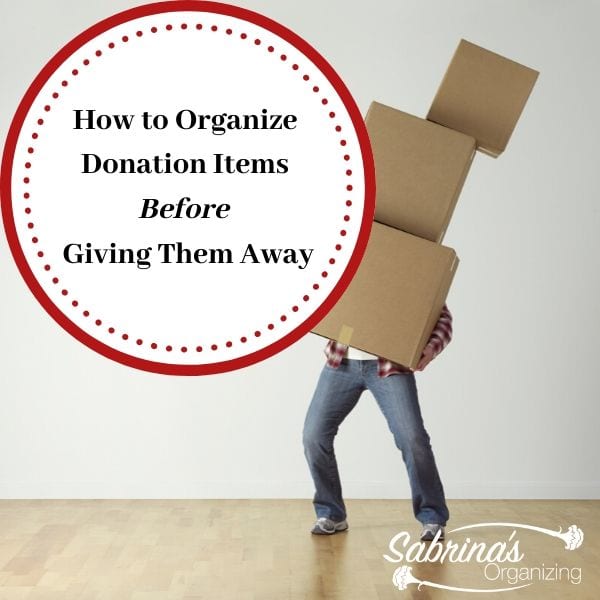

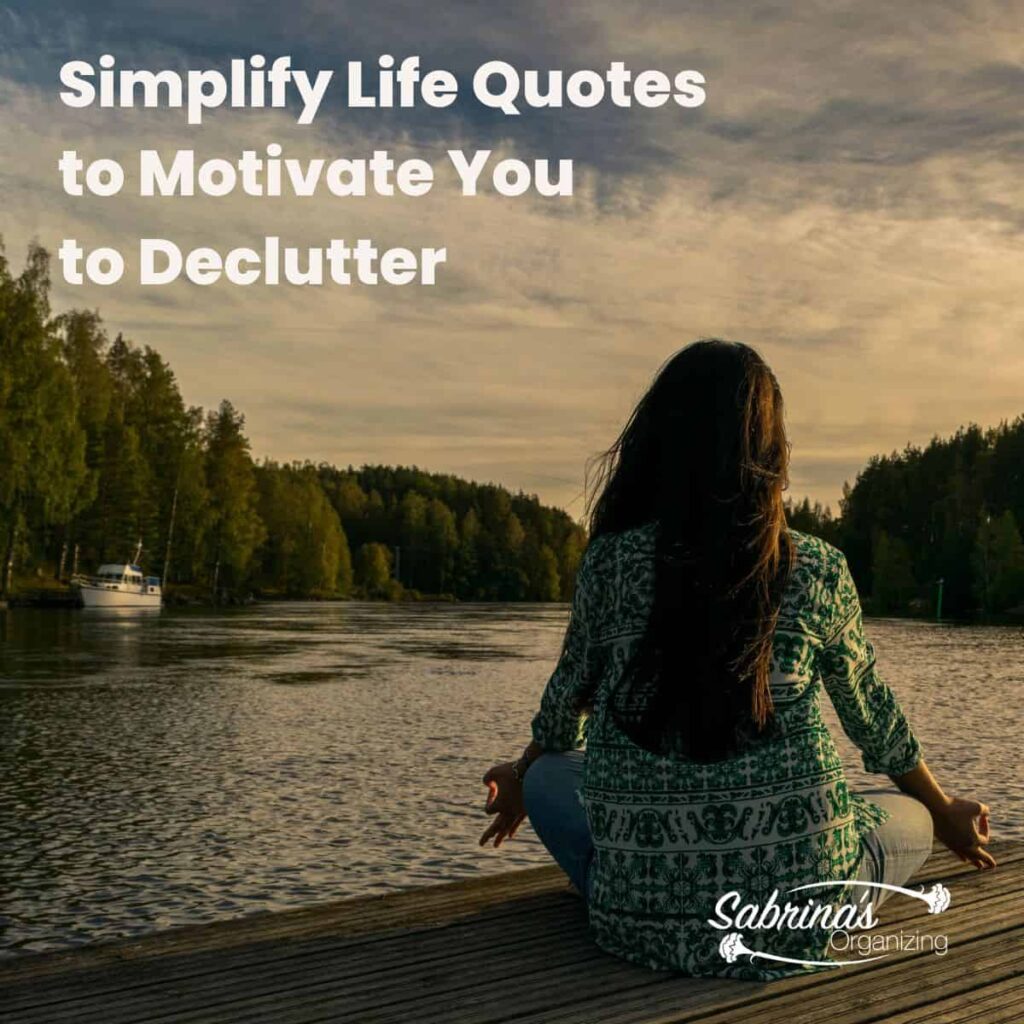



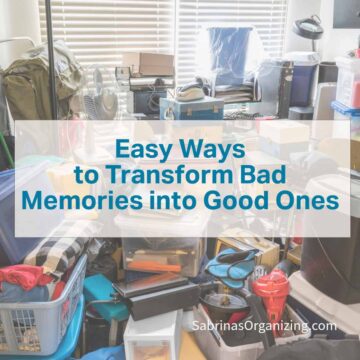

Janet Schiesl says
This is a helpful narrative to have on hand for guiding people through the anxiety of decluttering. It's so important to balance the what-ifs with the what is currently happening. You don't want an imagined future to get in the way of enjoying the reality of your now.
Julie Bestry says
This is such an important line of thinking. So often, the "just in case..." just trails off. Just in case of what? You're going to hold onto carbon copies of checks you wrote in 1987 just in case you're audited? Do you know that the IRS doesn't accept carbon copies of checks (for many reasons, not the least of which it doesn't prove you actually gave the check to anyone; it's not a canceled check!)? Did you know they don't go back 24+ years to audit people? You're going to hold onto this printed, clipped article about housing interest rates just in case you buy a house? How long do you think these particular interest rates are this month are going to be if you buy a house six months, or six years from now. Taking the "just in case," the "what if," and the "but" to their logical conclusions definitely puts people in a stronger position to confidently make decisions. Great post.
Diane N Quintana says
I like the way you challenge the reader to remove the word 'but' from the sentence. Reframing the way we look at the situation can prompt us into action. I also appreciate the idea that we all make excuses or present reasons which prevent us from taking action. Understanding how to work around those reasons or excuses is empowering. Thank you for this great post, Sabrina.
Sabrina Quairoli says
Thanks for stopping by and commenting, Diane!
Janet Barclay says
My sister and I were talking about this recently, and we concluded that sometimes we just need someone to take it away. Even if it ultimately ends up in the trash or being sold, it's no longer ours to worry about.
At the time we were remembering a friend of my father's who took away a ton of tools that we didn't want and didn't know what to do with. We thought he was going to share them with other members of their church, but looking back (and having sifted through my sister's own tool collection), we suspect much of it was garbage and he understood we didn't have the mental energy needed to sort them out nor the emotional energy to just toss them all.
Sabrina Quairoli says
Good point! Thanks for sharing, Janet.
Linda Samuels says
Language is powerful. The questions we ask can help or hinder our progress. The use of "what if" for the phrases you described can definitely prevent us from moving forward. If we allow worry or an abundance of caution to influence some of decisions around letting go, the process will get slowed or even come to a stop.
To counter balance those tendencies to make excuses or dig it, get clear on why you want to make a change. Then if one of the not-helpful questions or phrase appear, you can hold it up to your 'big why' and see if it supports it or not. That can make it easier to reframe the unhelpful questions.
Sabrina Quairoli says
Great tip, Linda! Thanks for sharing your thoughts.
Seana Turner says
Excellent post! It really puts the responsibility back onto us for managing our own stuff. Your phrase, "we are responsible for the clutter in our lives" is powerful. I think a lot of the excuses are ways we try to avoid that truth.
Do we need to keep some things on hand "just in case?" Yes, for sure. But when we apply that reason too broadly, it gets us into trouble.
This post shows that we aren't powerless in the face of an overwhelming situation. There are steps we can take. That is so important to remember.
Sabrina Quairoli says
Thanks for stopping by and commenting, Seana! I totally agree.
Jonda Beattie says
Thinking that we might need this item someday paralyzes a lot of people and keeps them from decluttering. I like to tell my clients that if you get rid of 50 items and you do need to go back and repurchase two of them - you are way ahead!
Sabrina Quairoli says
Great point! Thanks for sharing, Jonda!